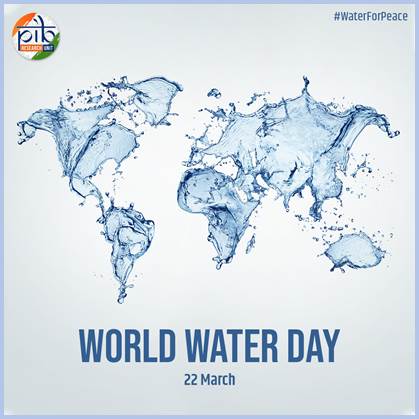Others
World Water Day (March 22)
Posted On: 22 MAR 2024 5:17PM
World Water Day is celebrated annually on March 22 as a United Nations Observance since its inception in 1993. It serves as a platform to celebrate water and raise awareness about the staggering billions of people worldwide currently lacking access to safe water. A central focus of World Water Day is to inspire action towards achieving Sustainable Development Goal (SDG) 6: Water and Sanitation for all by 2030.[1]
The theme for World Water Day 2024 is “Water for Peace" and it reminds us of the critical role this essential resource plays in fostering cooperation.[2]

Status of Water Resources
The status of the world's water resources reflects a growing demand driven by socio-economic development and shifting consumption patterns. Freshwater use has been increasing by nearly 1% annually, with agriculture, industry, and domestic sectors being primary drivers. As economies industrialize and populations urbanize, water demand rises alongside the expansion of water supply and sanitation systems. Interestingly, while population growth contributes, regions with the fastest-growing populations often have lower per capita water usage. However, severe water scarcity affects approximately half of the global population for part of the year, with a quarter facing extremely high levels of water stress, utilizing over 80% of their annual renewable freshwater supply.
Water for a Sustainable Economy and a Peaceful World
The role of water in the economy is multifaceted and intricate, with its availability influencing various sectors in different ways. Despite the complexity, there exists a crucial relationship between a country's per capita GDP and its water resources, albeit not directly correlated due to diverse economic and trade dynamics.
In low- and lower-middle-income nations, where agriculture and water-intensive industries are primary sources of employment, the availability of water holds significant importance for economic stability and growth. Investments in water, sanitation, and hygiene services not only yield substantial positive returns but also have far-reaching impacts on health, education, and employment opportunities, particularly in these regions.
Agriculture, being a cornerstone of sustainable development, heavily relies on water, making it vulnerable to climate-related risks that can adversely affect production, especially for smallholder farmers. Therefore, strategic investments in irrigation infrastructure and responsible water governance are imperative to ensure equitable access and mitigate vulnerabilities.
Additionally, water availability and quality significantly influence industrial prosperity, with disruptions in supply chains due to water-related problems posing economic risks. Embracing technologies for water efficiency and reuse not only fosters industrial growth but also promotes environmental sustainability. In sum, recognizing the intricate interplay between water and the economy is essential for fostering sustainable development and ensuring equitable access to this vital resource.
Moreover, disparities in access to water, sanitation, and hygiene services, particularly in conflict areas, exacerbate challenges, disproportionately affecting vulnerable groups like women and girls. Effective disaster risk reduction policies can help alleviate these disparities and enhance resilience.
Water scarcity can be a source of tension, but cooperation is the key to resolving disputes and promoting regional stability. International law, water diplomacy, and inclusive governance involving local communities can help manage shared water resources like rivers and aquifers effectively.
The Way Forward
World Water Day is a call to action. By recognizing the importance of water for peace and prosperity, we can all be part of the solution:
- Educate Ourselves: Learn about water challenges in our region and the world and identify solutions to these problems.
- Conserve at Home: It is important to be mindful of water use, fix leaks, and adopt water conservation techniques at home. Every drop of water is essential.
- Adopting new techniques: It is important to identify and apply different water conservation techniques like Rainwater harvesting, drip irrigation systems and multiple water reuse systems as much as possible. These small steps will cohere to bring about a great change.
- Spread Awareness: Raising awareness about the water crisis is the most important step towards water conservation. Talking to friends and family about the importance of water conservation and cooperation will help in collective action.
Let's work together to ensure water is a source of a peaceful and prosperous future.
References:
Click here to see Explainer in PDF
Nimish Rustagi/ Himanshu Pathak/ Ritu Kataria/ Madiha Iqbal
(Backgrounder ID: 151880)
Visitor Counter : 1486